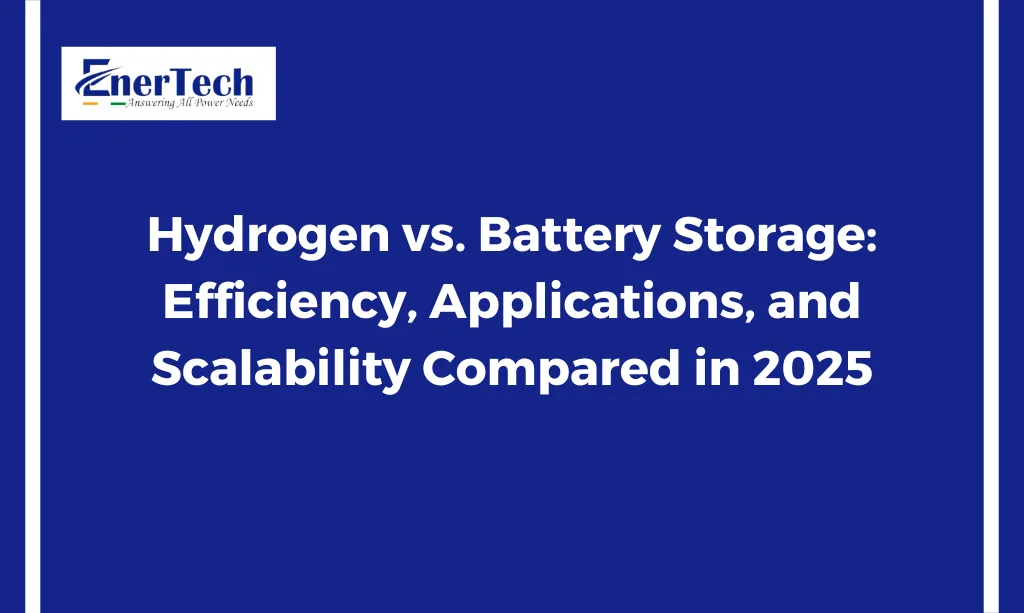While on its journey towards decarbonization, the world encounters several challenges, questions, and dilemmas concerning choices.
One of the most common ones is choosing between a hydrogen energy storage system and a battery energy storage system.
Now, this signifies a debate. But it isn’t about what is better between the two or the winner. It is more about how both will complement each other to help the world create a more resilient and sustainable energy system.
So, let’s explore the unique characteristics of both and understand their applicability across the challenging and evolving energy landscape.
What is a Hydrogen Energy Storage System?
A hydrogen storage system is a multi-step process. It splits water into hydrogen and oxygen through electrolysis. Then, the system stores hydrogen gas in large tanks under high pressure as a cryogenic liquid or in underground salt caverns for long-term storage. When you need energy, the system converts hydrogen into electricity with a fuel cell. But the process is less efficient. The round-trip efficiency is often up to 45%.
What is a Battery Energy Storage System?
Also called BESS, the system stores electrical energy in a set of rechargeable batteries – usually lithium-ion. These are larger versions of the batteries in your EV or phone. They charge by drawing electricity from the grid or a renewable source like solar panels and then discharge when required.
BESS is crucial for short-duration and rapid power. Hence, they are ideal to stabilize the grid, ensure peak shaving, and integrate intermittent renewables. The systems are highly efficient, delivering a round-trip efficiency of up to 95%.
Now that you’ve seen the basics of both technologies, let’s compare them in terms of efficiency, applications, and scalability.
Efficiency
Evidently, BESS has a higher efficiency. Hence, here, it has a clear advantage. It directly converts electrical energy into chemical energy and back to electrical energy. Therefore, the energy loss is minimal.
In the case of hydrogen energy storage, the system loses energy at multiple stages, which are during electrolysis, compression, or liquefaction for storage. And then, the loss also happens when the system converts the energy back into electricity in a fuel cell.
Mathematically, for every 100 kWh of electricity to produce and store hydrogen, you can only recover up to 45 kWh. On the other hand, a BESS can return up to 95 kWh.
Applications
Efficiency differences between these systems often govern their applications. Batteries are a proven option. They champion short-term storage and rapid-response applications. Therefore, they are apt for.
- Stabilizing the grid that needs to respond quickly to grid frequency fluctuations
- Discharging power during high demand periods to reduce costs – peak shaving
- Providing power for light- and medium-duty automobiles
Hydrogen energy storage systems also have certain application advantages. They are useful for long-term, seasonal, and high-energy-density applications. You can use them to store energy for longer periods without substantial energy loss. Hence, they suit.
- Storing surplus renewable energy from cold or hot seasons to use it later
- Powering trucks, trains, and maritime shipping
- Providing clean fuel for applications like steel and chemical manufacturing
Scalability
Battery storage scales in a decentralized way. But speak of territorial and volume-based scalability, hydrogen appears as a long-term advantage. You can store large-scale hydrogen in geological formations like salt caverns. They can hold gargantuan amounts of energy for a very long time. Hence, the system is essential for cross-seasonal storage. It is a critical requirement for a grid that runs on solar and wind.
When to Choose What?
Again, as mentioned above, there’s no clear podium winner in this case. And it shouldn’t be like that, as each application has a unique requirement. Creating synergies is a much better approach, particularly in a robust energy ecosystem. So,
Choose batteries when you need quick response, short-term energy storage, and high efficiency. It includes EVs, solar setups, and grid services like regulating frequency.
On the other hand, you can choose hydrogen to store large amounts of energy in the long run or for heavy-duty applications. It includes storing excess renewable energy for the cold season and powering distant transportation that you cannot easily electrify with batteries. Hydrogen’s higher energy density and long-term storage potential make it a standout for such challenging applications.
Request Quote: Battery Energy Storage System- EnerCube
Embracing a Collaborative Approach with EnerTech’s BESS and HESS
Whether manufacturing battery energy storage solutions or strengthening the hydrogen energy storage ecosystem, EnerTech excels in both.
Our systems are engineered to excellence to serve challenging industrial, residential, and mobility applications. They focus on storage efficiency, performance, and energy management, helping the world accelerate its journey to sustainability.
Besides, our systems focus on continuous improvements to ensure they evolve per the world’s changing energy storage needs and challenges.
Explore our comprehensive product range to learn more about every detail of our energy storage solutions. Email us at sales@enertechups.com to connect with our experts and discuss your requirements with us.




